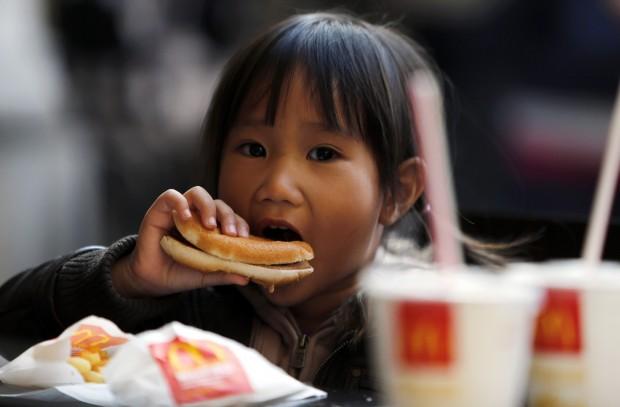Study Points to 10 Key Nutrition Interventions that Could Save the Lives of Children
A child eats a hamburger outside a McDonald’s fast food restaurant in downtown Milan October 16, 2012. The restaurant gave out meals for free before closing down after 20 years. REUTERS/Stefano Rellandini (ITALY – Tags: FOOD BUSINESS) ATTENTION EDITORS: ITALIAN LAW REQUIRES THAT THE FACES OF MINORS ARE MASKED IN PUBLICATIONS WITHIN ITALY – RTR397CC
A new study in the journal The Lancet outlines 10 key nutrition interventions that could save the lives of almost a million children a year.
These interventions include giving vitamin A and zinc supplements to toddlers, and offering calcium to pregnant women.
Host Marco Werman speaks with the study's lead author, Professor Zulfiqar Bhutta of the Aga Khan University in Karachi, Pakistan.
Read the Transcript
The text below is a phonetic transcript of a radio story broadcast by PRI’s THE WORLD. It has been created on deadline by a contractor for PRI. The transcript is included here to facilitate internet searches for audio content. Please report any transcribing errors to theworld@pri.org. This transcript may not be in its final form, and it may be updated. Please be aware that the authoritative record of material distributed by PRI’s THE WORLD is the program audio.
Marco Werman: What's for Lunch is focusing on how to make the world's food systems more climate friendly. Of course, the most basic requirement of that food system is to provide everyone with a healthy diet. That's something that eludes millions of the world's poorest people. But a study in the latest issue of the medical journal The Lancet finds that a few small changes could make a huge difference. The study lists ten fairly simple and inexpensive approaches that its authors say could save the lives of almost a million children a year in the developing world. Zulfiqar Bhutta is one of those authors. He's an expert on child health at the Aga Khan University in Karachi, in Pakistan, and he says the most important changes actually have to do not so much with children as with mothers.
Zulfiqar Bhutta: The first take-home message is that you need to address the health and nutrition of girls and would-be mothers as well as mothers to address child under-nutrition. The second take-home message is that simple interventions that address infant and young child feeding, promotion strategies to scale up exclusive breastfeeding, this is a life-saving intervention. What we are also also saying is that breastfeeding is not enough, unless it is coupled with appropriate complementary feeding.
Werman: Bhutta says that means ensuring better quality and more diverse diets for families who can afford them, and access to nutritional supplements for poorer families. But he says improving child nutrition requires thinking about more than food.
Bhutta: Addressing issues like optimizing the age at marriage for young girls, making sure that we don't have children having children, that we do not have multiple pregnancies which [xx] deplete women. Those are critically important and they are related in turn to issues like economic empowerment, education, and opportunities for women and young girls. But when you come to nutrition-specific interventions, you've got to differentiate between things that can be done where food insecurity is not an issue. So if people do not have access to food at all, or don't have access to good quality foods, just asking them to eat more of the same is not going to resolve the problem, and there, providing appropriate diets and support, economic support, to make that happen is very important.
Werman: And Bhutta says some of the most effective ways to assure access to healthy and diverse foods are actually some of the same things that need to be done to respond to climate change.
Bhutta: Increasing awareness of climate change also opens the door to investments that need to be made for improving agriculture, productivity, biofortification, of putting in economic policies to support small scale landholders, homestead gardening, and provision of food security at a small household level, those are things that we ought to be looking at the same time. So I think a major component of planning is to look at sustainable agriculture.
Werman: Professor Zulfiqar Bhutta chairs the division of women and child health at the Aga Khan University in Pakistan. His new study on interventions to improve maternal and child nutrition appears this week in the journal The Lancet.
Copyright ©2013 PRI’s THE WORLD. All rights reserved. No quotes from the materials contained herein may be used in any media without attribution to PRI’s THE WORLD. This transcript may not be reproduced, in whole or in part, without prior written permission. For further information, please email The World’s Permissions Coordinator at theworld@pri.org.
